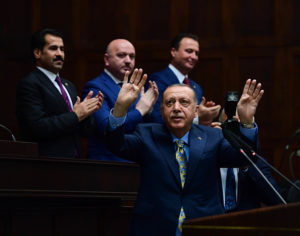Omer Taspinar is a professor of security studies at the National War College and a non-resident senior fellow at the Brookings Institution. Michael O’Hanlon is a senior fellow and director of research in foreign policy at the Brookings Institution.
In Washington these days it’s common to hear people wonder if the United States and allies should kick Turkey out of NATO. The fact that NATO has no precedent and no procedures to expel a member makes little difference to many who make this argument. Nor do the sacrifices that Turkey has made due to Syria’s civil war — a conflict often exacerbated by American as well as Turkish mistakes. In Turkey’s eyes, America has partnered with Kurdish terrorists, failed to take serious military action against Damascus and paid scant attention to Turkey’s troubles in absorbing more than 3.6 million Syrian refugees.
Washington, for its part, believes Turkey has supported Al Qaeda-linked militants in Syria and has prioritized good relations with Moscow and Tehran in its diplomatic efforts. The Erdogan government is also flirting with a quasi-alliance with Russia and plans to purchase the S-400 missile defense system — Russian technology that will likely include Russian advisors on the ground as part of the package deal — at the same time it expects the U.S. to share its crown jewel of stealth technology, the F-35 stealth fighter jets.
The alliance is at an impasse, and the strongman tendencies of Turkish President Recep Tayyip Erdogan only serve to make things worse. U.S. President Donald Trump has a penchant for getting along with such leaders, but whatever the merits and demerits of this particular characteristic of his, it is unclear that it can work with the current regime in Turkey. Washington has clearly warned Ankara that if Russian S-400s are deployed Turkey will not only have to forego the delivery of F-35s but also face severe military sanctions.
Once America follows through with kicking Turkey out of the F-35 program, as it is virtually certain to do in coming months, the downward spiral in U.S.-Turkish relations could descend to a new low. To be sure, tough times are ahead in this relationship. But rather than consider draconian measures on each side, including finding a way to sever Turkey’s ties to NATO, both sides should look for a soft landing that limits the damage to their strategic partnership.
The place to start is to see Erdogan as a nationalist rather than a dangerous Islamist. He is more interested in independence and sovereignty in decision-making. Western analysis of Erdogan’s Turkey often suffers from a binary fallacy — East versus West or Islamist versus secular. Such dichotomies are often too simplistic to capture the complex nature of Turkey’s principal strategic driver: nationalism. A more accurate way to think about Erdogan’s Turkey is to compare it with France under Charles de Gaulle. Erdogan’s basic strategic vision reflects a nationalist quest for Turkish independence, grandeur and lost imperial glory — in short, a Turkish version of Gaullism.
Perhaps where the Gaullist analogy for Turkey becomes most useful is in relations with NATO. Frustrated with the U.S. and in search of full independence in military affairs, de Gaulle’s France left the integrated military command of NATO in 1966. If Turkey insists on pursuing military and technological cooperation with Russia, Washington should encourage Turkey to consider this Gaullist option. Ankara could also see it as a way to protect its improved relationship with Russia.
In any case, Washington should not worry about Russia and Turkey forging a strategic alliance. Ankara and Moscow strongly differ on almost all regional issues of strategic importance. From the Balkans and Ukraine to Cyprus and the Armenian-Azeri conflict, or from Syria and Libya to Egypt and Israel, there is not a single arena where Turkey and Russia are natural partners. And it is important to remember that not too long ago, Turkey downed a Russian jet on the Turkish-Syrian border. A military confrontation between these two countries is certainly not in Washington’s interest.
Frankly, for a NATO alliance that already has its hands full with Russia, and that does not need to be asked to come to the defense of another country bordering Russia over a conflict that should be preventable, Washington should not be averse to the general idea of seeing Erdogan try to get along with Putin — even if Turkey’s decision on the S-400 is regrettable.
If Turkey left NATO’s integrated military command and minimized its role with the North Atlantic Council in Brussels, the alliance could survive with little real damage. The U.S. does not really count on Turkey to play a major role in deterring Russia on NATO’s exposed northern edge near the Baltic states and Poland. In any case, Ankara’s military cooperation with the U.S. further south in the Black Sea region and the Caucasus is modest and often bilateral. Cooperation over Syria policy is already mostly bilateral and outside of NATO mechanisms. Early-warning radar systems watching Iran from southern Turkey would certainly be convenient, but also replaceable. Similarly, there are alternatives for the Incirlik Air Base, where Turkish restrictions severely limit U.S. options anyway.
Thus, a Turkish decision at Ankara’s instigation but with the mutual consent of all the allies to pull out of NATO’s integrated military command structures would not appreciably weaken deterrence against any Russian threat. It would leave the mutual-defense obligations the allies share with each other intact.
Thus, it might constitute enough of a safety valve to indulge Turkish nationalism, and Erdogan’s ego, in a way that blew off strategic steam with minimal damage to core requirements of deterrence and defense and without causing ripple effects that weaken NATO in any other way. If Ankara genuinely wants to pursue its plans for military independence by embarking on a rapprochement with Russia, Washington should embrace a Gaullist option instead of fantasies of kicking Turkey out of NATO.





